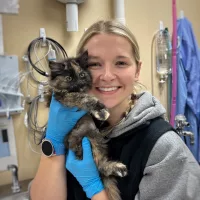
Cinder, a tiny one pound kitten that was brought to the Humane Society of Central Oregon (HSCO) was discovered to be a rare type of cat: a male tortoiseshell cat that is also a hermaphrodite (feline disorder of sexual development (DSD)).
Tortoiseshell colored cats, recognized for their striking swirls of black and shades of orange, are typically female. The Humane Society of Central Oregon’s Medical Director, Crystal Bloodworth, DVM, said “to call it a male is tough, but with the binary nature of animals and people’s perception of animals, we chose male.” The decision was based on the fact that the gonads (sex hormone producing organ) are male, and two were removed during what was expected to be a spay surgery.
This kitten is very likely a three sex chromosome cat XXY. The two X chromosomes allow for the tortoiseshell coloring and the Y chromosome allows for the testicles. There are a lot of variations of hermaphroditism or intersex (feline DSD). “In the kitten, it did not have a uterus or ovaries, did have testicles and has what looks like a vulva” explained Dr. Bloodworth, DVM. She continued that if one were to examine Cinder as an adult, they would consider it a female because the external genitalia looks profoundly like a female, not to mention the fact that it is a tortoiseshell cat.
HSCO’s Clinic Manager, Bailey Shelton, CVT said “it was like spotting a unicorn! Even though I’ve only been in the veterinary field for nine years, this very well could be a once-in-a-career moment. They always talked about how rare male tortoiseshells are back in school, but seeing one in person is something else. You just never know what amazing surprises await you at the humane society!”
Annie Pulzone, CVT, said that in her twenty-year career, she has seen one other XXY cat, “but it is always fun to see these types of animals in one’s career because they are so rare.”
Cinder arrived as a one pound kitten in late April as part of an owner relinquished litter. Based on coat color and external genitalia, it went into a foster home as a female and was named Cindi. Her foster family said she was a typical loving, adventuresome and playful kitten. After five weeks in foster care, Cindi returned for her spay surgery. During the surgery Dr Bloodworth discovered Cindi did not have a uterus nor ovaries. The HSCO veterinary team found and removed two testicles. After the surgery, Cindi was renamed Cinder.
Dr Bloodworth has performed “tens of thousands of cat surgeries” in her shelter medicine career, and has only seen one other male calico and only a handful of true hermaphrodite animals.
Cinder has several families interested in having him join their family. HSCO expects to finalize an adoption soon.















